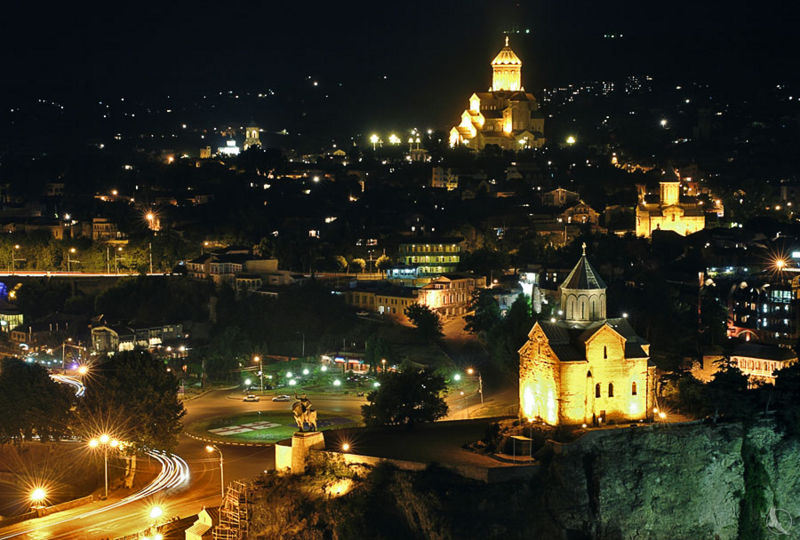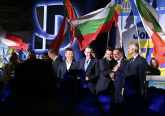
What matters more: who you think you are or who others think you are? Addressing a major gap in IR scholarship, the importance of identity in influencing state behaviour was first elucidated by writers within the Constructivist school of thought, most notable among whom was Alexander Wendt. In his seminal article “Anarchy is what states make of it”, Wendt draws attention to the significance of identity by employing the metaphor of “the looking-glass self”, arguing that states form identities of themselves through their interactions with other states: that “the self is a reflection of an actor’s socialization”(Wendt 1992:404). Such a theory seems to predict that a state’s identity and how others perceive it should bear correlation. How, then, do we explain instances when a state’s conception of itself differs markedly from the perceptions of others?
On a recent visit to Georgia, a country that western Europe views as part of western Asia (being part of Eurovision doesn’t count – so is Israel), your correspondent was struck by the extent to which the people there do in fact consider themselves culturally, politically and geographically European. The EU flags flown on nearly every major street in the capital and galleries dedicated to shows of “European” art or culture speak of a nation determined to graft itself onto the European continent. Indeed, their determination in doing so openly defies the clear political reality: despite falling beyond the Caucasus Mountains, and thereby geographically within Asia, and having even their NATO accession vetoed by France and Germany, nearly every political party in Georgia cites accession to the EU as one of its main policies.
The extent of Georgia’s self-delusion was clearly demonstrated in 2008 when it launched its invasion of South Ossetia, a breakaway province whose autonomy is guaranteed by Russia. Since Georgia cannot have failed to realise that Russia would oppose a violent reintegration of the secessionist territory, or that the possibility of winning a war with Russia was nil, Saakashvili’s confidence that the invasion was still a realistic option could only have stemmed from a belief – resting on the perception of Georgia as an integral part of the Western alliance – that NATO would certainly back him, and the threat of them doing so would be enough to prevent Russia from retaliating. Unfortunately for Saakashvili, Russia knew better.
How can we account for this disconnect between how Georgia views itself and how the rest of the world views it? Georgia’s process of identity formation, as a bulwark of Christianity against the Islamic world, naturally led it to view itself as part of a greater whole, Christendom, defined against the East – the land of its enemy. However, for the countries of Western Europe, as the centuries passed and memories of Holy Wars gave way to the hopes of the enlightenment, the boundaries of Christendom became gradually less important than the boundaries of ‘Western civilization’ which were both culturally and politically narrower than those of Christendom. Georgia’s absorption into Russia and later the Soviet Union allowed it to be largely forgotten by the remainder of Europe, even if a distinctly European culture and heritage were preserved within the country itself, frozen during the years of ‘occupation’. By the time of the fall of the Berlin wall, Georgia – eager to return to the West – suddenly found itself defined as the “other” by its erstwhile friends and as outside the new boundaries of the European world, the EU.
Georgia is far from the only country to feel itself entitled to be part of the European project only to find its demands for recognition rebuffed. Indeed, Georgia’s problem highlights a widespread issue inherent within projects of regional integration: what happens to those left on the edges? The intense integration of the European Union, in binding the countries of the inner circle together, has necessarily meant a hardening of its external borders, both literally and metaphorically. This has had noticeably negative effects for outsiders in terms of access to markets and migration opportunities which “neighbourhood policies” have done little to compensate for. Georgia’s foundering attempts at democracy and construction of a national identity have, in part, been beleaguered by this rejection, as have those of many of the new states on Europe’s periphery. This is because support for democracy and self-determination were based in part upon the assumption that such things were an intrinsic part of their Western identity – to find this heritage denied by those they wished to join meant a loss of identity and corresponding political ideological crisis.
As Europe is forced to bind itself closer together in order to save the European dream, the possibility for further expansion only becomes narrower or confined to the option of a two-tiered Europe within which the periphery nations would continue to be outsiders. For the Caucasus, this means that the region will continue to be a fracturing bridge between two worlds, perennially defined by what it isn’t. Excluded from the projects of regional integration occurring around it and failing to come to terms with what a Caucasian identity might be, the region looks set to remain troubled for some time. At least, from the perspective of inner Europe, their troubles will remain far outside our borders and can therefore be comfortably ignored. Pity the forgotten nations of the Caucasus.
Kate Brooks is an Oxford MPhil student in International Relations.








2 Comments
Very interesting points, and very much confirms what I observed when in Georgia for a few days last summer. The contrast with Armenia is also interesting – you see hardly any EU flags there and the focus on other parts of the world (Russia, but not only, also US, but clearly not so much the EU) is evident.
Tongue-in-cheek comparison, which is nonetheless informative: in a popular outdoors café right on Republic Square in Yerevan (the main city square), it was hardly possible to order a drink in English – though Russian works. In the centre of Tbilisi (e.g. Shardeni / Bambis Rigi), English is understood by a lot of people.
Armenia, and I suspect also Azerbaijan, will not take too great offense at continually being snubbed by the EU – Georgia however will be deeply unhappy, especially after having made concessions such as not vetoing Russia’s accession to the WTO…
The Caucasus: Negotiating our identity despite ontological assumptions
When a young scholar devotes time, and even takes a field trip to Georgia I rejoice. And constructivist analysis indeed makes sense in Georgia, if anything because there is a clear cleavage of generations amongst policy makers in Tbilisi: old school veterans brought up in the USSR, like me, and born-and-bread Georgians of the newborn state. There is a lot for a constructivist to dig up there. However, there are some objections to be raised in view of Ms Brook’s analysis, both methodological and substantive. The issue about Georgia’s identity – as posed – is the following: “who you are versus what others think you are.” The two do not seem to coincide, which means Georgians fail to touch base with reality.
The methodological objection gravitates around the proper use of constructivist notions. Surely, “who we are” and “what we are thought of” as Georgians is a set of questions with mutually constitutive answers. Ultimately, constructivists suggest, identity is a contextually bounded negotiation process. And, taking a realist’s perspective on that front, let us note that shaping perceptions about a country (nation-branding) is a lobbying/media spinning battlefield as well as a multi-million dollar industry.
But, more substantively, one should set the “false identity” theme in context. “Returning to Europe” was the utopia of choice for the biggest part of Eastern Europe and the former USSR for decades, associated with projects such as “open market reforms,” democratization, or indeed the adoption of the acquis communautaire. If Georgians dwell on false identity, those designing European Neighborhood Policy have not been informed. For EU and NATO “conditionalities” are designed to inspire the perception of a unidirectional path paved with progress reports which, nonetheless, is open to every “European,” including Georgians. So, rather than collective delusion, we might be accused for biting into the “Third Wave” democratization theorem with the confidence inspired by the “End of History” teleology.
Perhaps, it sounds naïve. President’s Saakasvilli’s keeps suggesting that the West will descent upon Georgia as deux ex machina; he did so during the 2008 invasion; he keeps doing so as this “magic formula” is the essence of his “exit strategy” from our current deadlock. His naiveté may be annoying, passé, but hardly unfounded. It is associated with the messianic belief in an ever victorious liberal order destined to prevail. True, the world has changed since 1989. Apparently, the rising stars of the new economic system are State Owned Enterprises, not Joint Stock Companies; an open market economy does not go hand-in-hand with democracy; Russia has reasserted its will to delineate a “Near Abroad” lebensraum; Turkey is snubbing EU membership; as the economic crisis unfolds, the EU has proved to be little more than the “sum of its parts.” And still, our President professes salvation with the audacity of a prophet. And, to be fair, most of us would readily sign on the dream of European Integration anytime, anyplace, not despite reality, but because of reality as we perceive it; not because we believe in our President, but because eventually a liberal order in Georgia is what we want.
Perhaps naively, we have invested a lot of what we are in the belief that Europe is indeed our future. Remember, it was a Georgian Foreign Minister of the USSR that brokered the deal for the bloodless collapse of the Berlin Wall, which we now tend to take fore granted. That does not mean that Georgia, or indeed the Caucasus, neatly fits the mindset of our European observers. For instance, when it comes to defining Georgia as a “bulwark of Christianity,” once again, Ms Brooks parts from her originally constructivist position. True, Georgia, Armenia and, by the way, Ethiopia were the first Christian Kingdoms in the World; but, our history cannot be reduced to a crusade against Islam. One of our most significant allies is Azerbaijan, whose Shi’a Islamic heritage is distinct from its political culture, founded on Turanic and republican ideals of the New Turkish Movement rather than Jihadism. Such neat East-West dichotomies are contextually senseless.
Georgians cherish democracy for its own merits, not merely in a vein quest to become “more European” or “win the Eurovision.” Besides, being European also comes with a wish for visa-free travel, market access and foreign direct investment. We are as calculating and as idealistic as anyone, not naïve “wannabe” Europeans in a god forsaken corner of Asia. Clearly, an anarchic world is in fact what we make of it. In choosing one “European path” we denounce another; Russia is Europe too. We do not delude ourselves, we make choices.
One day, during one my visits to Oxford, a cub driver of Pakistani origin asked me: “Is it true that in the Continent you drive on the wrong side of the road?” This episode highlights how situational and fluid identity discourse can be. Who drives on the “right” side of the road; where is Britain in relation to “the Continent;” who is British after all. These questions are up for negotiation. So, as scholars take field trips to Tbilisi, it would be wise to address the question “what does being European mean” in this context. This is the beginning of good constructivist research. One thing is surely promising: Georgia has a wine culture of European standards that scholars are bound to appreciate if they are Italian or French. Alas, Europe is a place with hybrid tastes and identities, so even Britons can develop a taste for the “continental.” So please, come again.
Ambassador Tedo Japaridze,
Tbilisi, Georgia